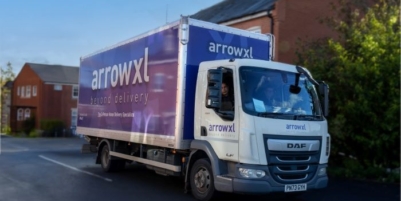-
Sparck Technologies awarded Royal designation - March 27, 2025
-
OpenADR Alliance announces first OpenADR 3.0 certified products with EVoke Systems, E.ON Energy and Universal Devices - March 25, 2025
-
Growing fulfilment and contract packer appoints new Managing Director - March 25, 2025
-
When is it time to invest in a WMS? Understanding the key trigger points - March 25, 2025
-
eCapital helps Vantage Recruitment on its journey to financial success - March 24, 2025
-
Hugo Beck Celebrates 70 Years of Packaging Innovation with Open House Events - March 20, 2025
-
PROLOG FULFILMENT SUPPORTS LUNA DAILY’S COMMITMENT TO BETTER BODY CARE FOR ALL WOMEN - March 19, 2025
-
Motion Ventures launches largest-ever maritime tech fund at $100M to meet the industry’s new pace of adoption - March 18, 2025
-
ITD GLOBAL APPOINTS GROUP CHIEF REVENUE OFFICER - March 17, 2025
-
SURECAM TEAMS UP WITH ENTERPRISE FLEX-E-RENT FOR VEHICLE REPAIR & MAINTENANCE CONFERENCE - March 14, 2025
With Brexit now official, there will obviously be far-reaching, and potentially costly, impacts for cross-border shipping, especially in the event of no deal being agreed before 31 December. Logistyx Technologies, a leader in transportation management systems (TMS) for parcels, recent White Paper identifies a variety of hurdles Brexit creates for cross-border shippers which could disrupt deliveries and customer service and increase costs:
- The UK’s exit from the EU means countries will receive new country codes for shipping, creating an immediate challenge. Shipping software that doesn’t include the new codes can lead to misrouted parcels, causing delays, losses and spoilage of time-sensitive or perishable goods.
- With Brexit turning the UK into a non-domestic destination for EU countries, shipments from and to the EU will now be regarded as exports. The immediate surge in exports will mean a high chance of goods ending up in bonded warehousing which is going to become increasingly hard to find.
- Retailers and distributors will need to determine cross-border tax calculations and adjust costs on ecommerce orders before transactions occur to ensure customers aren’t surprised by additional fees and taxes upon receipt of goods. They will also need to be able to track shipments and alert customers in advance about unexpected delays, for example because of customs hold-ups.
- While the UK data protection act closely mirrored GDPR, Brexit could still have an impact on data privacy when it comes to cross-border shipping. Under GDPR Member State companies may freely transfer personal information between Britain and the rest of the EU, but it remains a grey area whether they will still be able to do this post-Brexit without any additional legal mechanism.
- Most shipping software only provides line items to destinations outside the EU – failure to fully update software will mean the UK is still considered a domestic destination, leading to problems including increased time at customs, congestion at freeports, and potential issues with duty payments.
































